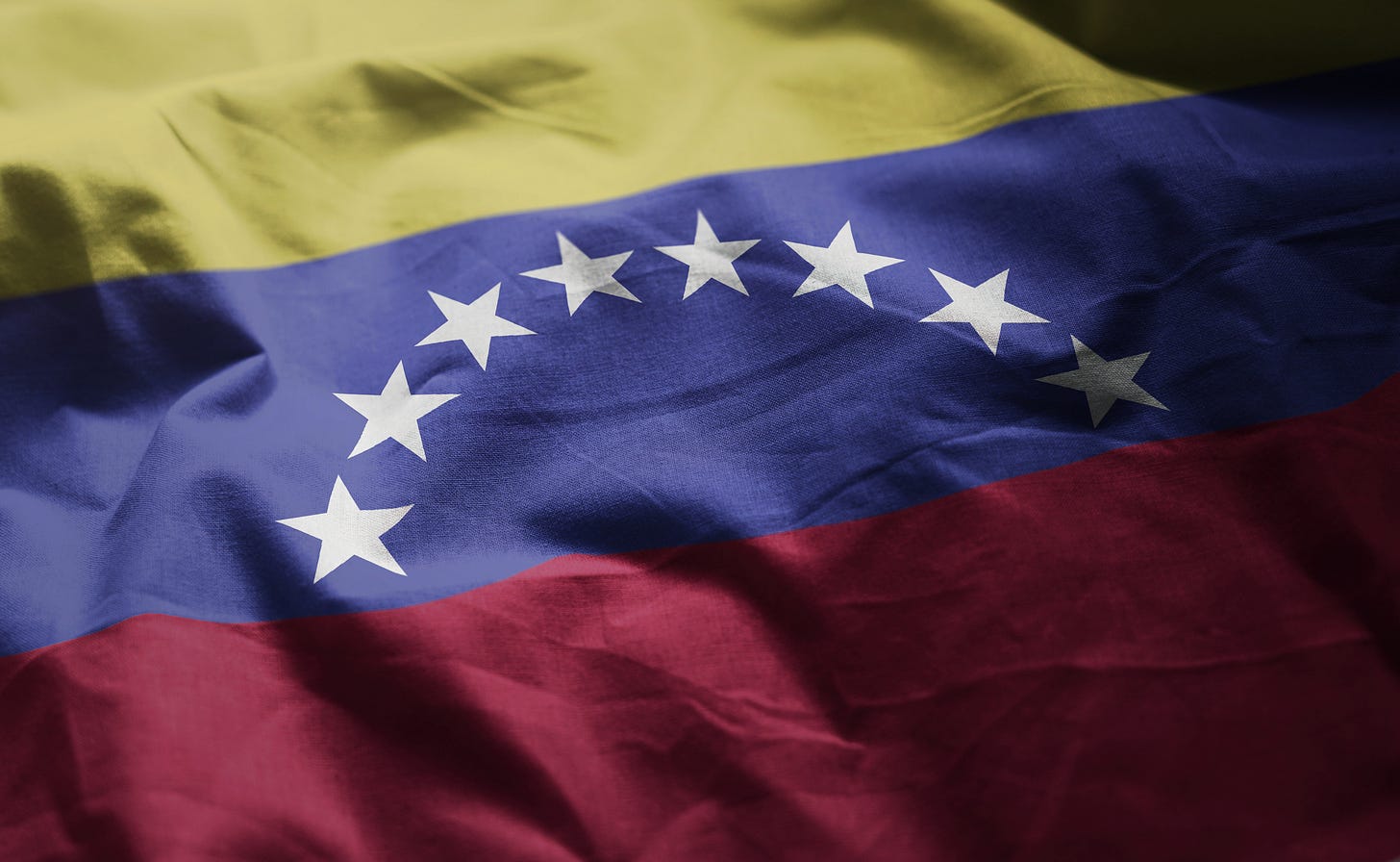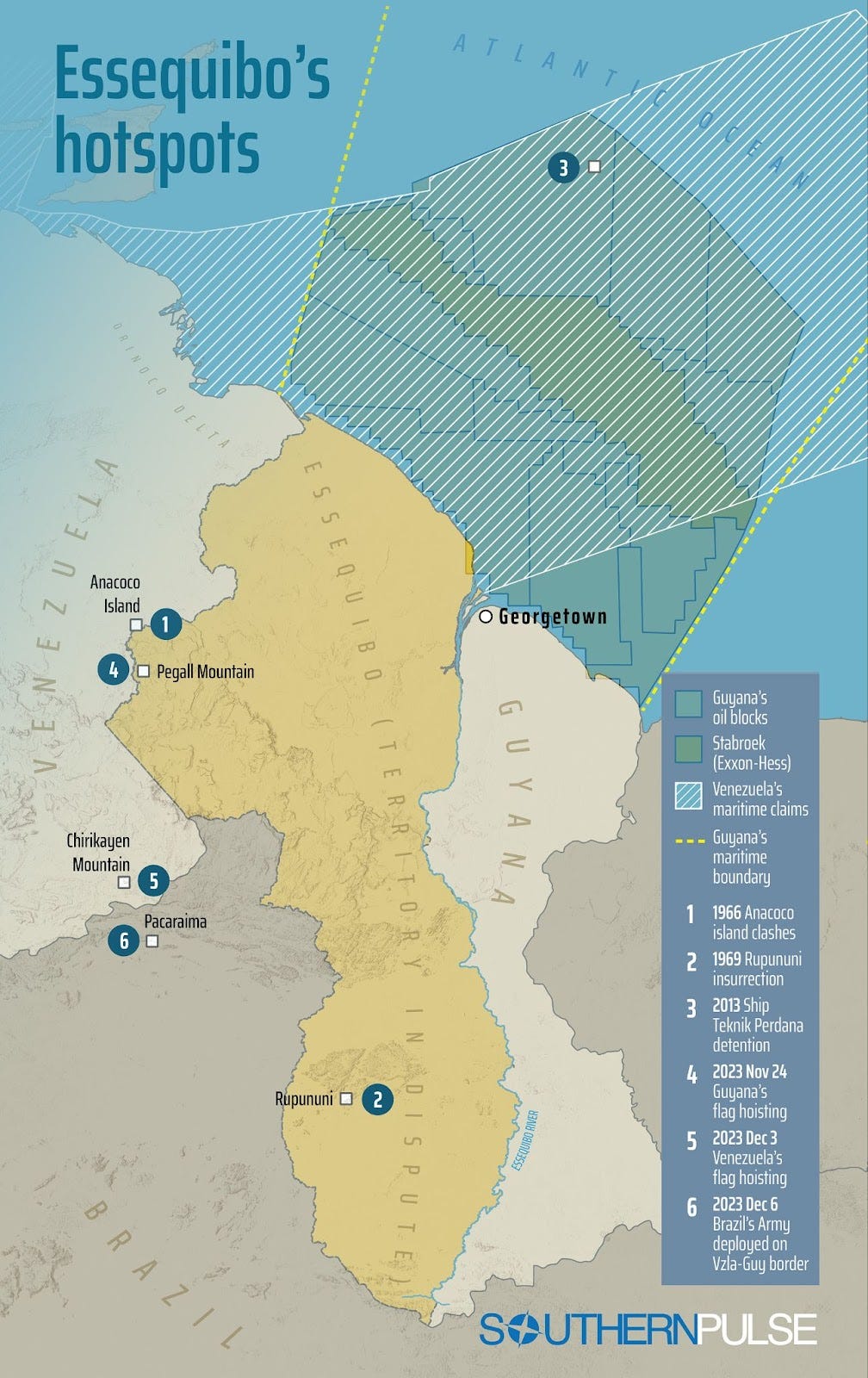As Venezuela gears up for presidential elections scheduled for 28 July 2024, keeping up with the complicated dynamics driving the country’s political and economic landscape can be difficult.
Since Venezuela’s highest court ruled that the government could ban former opposition candidate María Corina Machado from running for office, all eyes have been on how free and fair the country’s presidential elections will truly be. Between the US reimposing sanctions on the country and a relatively unknown candidate clearly winning in the polls, affairs in Venezuela are changing by the minute.
To help keep up with these complex topics, Southern Pulse has made a list of the top five things you should keep an eye on in Venezuela.
1 - US Reimposes General License 44 Sanctions
The US government has reimposed sanctions related to the US Treasury Department’s Office of Foreign Assets Control (OFAC) General License 44 (GL 44), which it decided to revoke after concluding that Maduro’s regime was currently not fully complying with its commitments to free and fair elections.
The US government replaced GL 44 with a new license called GL 44A on 17 April 2024, which gives companies the option of either requesting special licenses to continue in-country operations or 45 days to exit the country. That timeframe ends on 31 May 2024.
Most major oil and gas players and key vendors will not be directly affected by this exact shift, as they operate in Venezuela under existing OFAC-issued licenses.
Companies that were permitted to operate under GL 44 must now request a new, special license to keep doing business in the country. These special licenses will not be made public unless companies disclose they have obtained them. Southern Pulse understands that some of these special licenses may be granted in as little as 24 hours. While GL 44 was valid for six months, it appears that the new licenses may not have a specific timestamp.
OFAC granted the overarching GL 44 license in October 2023. This allowed for increased oil and gas activity in the country and for new companies without special licenses to enter the market and do business with state-owned oil and gas company Petróleos de Venezuela (PDVSA).
The US State Department said it would not renew GL 44 because President Nicolás Maduro’s administration did not fully comply with the Barbados Agreement, which centers on allowing democratic elections to take place this year. The department said it was “concerned that Maduro and his representatives prevented the democratic opposition from registering the candidate of their choice, harassed and intimidated political opponents, and unjustly detained numerous political actors and members of civil society.”
In the meantime, the US continues negotiating with the government of Venezuela and the opposition regarding the elections scheduled for 28 July and the sanctions landscape. Venezuela observers expect 31 May 2024 — the end of the GL 44 wind-down period — to be an important date. Southern Pulse believes the US may use the aforementioned special licenses as a carrot for Maduro’s regime. They may use each license granted as an incentive for the government to comply with elections or ask for political prisoners to be released, among other things.
Because the US is still negotiating with Venezuela’s government and the opposition, the end of GL 44 could arguably be viewed as a symbolic posturing tactic. It allows the country more leverage while companies apply for new, special licenses. Regardless, the US government does not seem interested in reimposing widespread sanctions as seen under former president Donald Trump’s administration.
2 - A Little-Known Presidential Candidate is Beating Maduro in the Polls
A relatively unknown candidate has a significant lead over Maduro in the polls after unexpectedly winning the main opposition coalition’s broad support.
In a shocking turn, Venezuela’s historically fractured opposition coalition largely came together and backed unknown candidate Edmundo González Urrutia. Though pollsters vary, one recent poll by Delphos shows that González has a significant lead over Maduro.
González, 74, served as Venezuela’s ambassador to Algeria between 1991 and 1993. He was also an ambassador to Argentina in the first years of former Venezuelan president Hugo Chávez’s administration, El País reported. Since then, he has been known for his academic work. The former diplomat did not expect to have a political career, a New York Times profile pointed out.
Such unification of Venezuela’s opposition is highly unusual. Furthermore, Southern Pulse is aware that other Venezuela observers are closely watching whether the two fringe opposition parties that didn’t initially support González — Fuerza Vecinal and Primero Justicia (taken over by the government) — could become ready to quietly back him as well.
González ended up becoming the opposition’s presidential candidate after a series of events kept other presidential hopefuls — namely Machado and her placeholder Corina Yoris — from running. After the Maduro regime banned Machado, Zulia Governor Manuel Rosales looked to be the leading opposition candidate and even registered initially to be on the ballot. More recently, he came behind the Plataforma Unitaria (PU) and has backed González.
3 - Venezuela’s Former Oil Minister Arrested in Corruption Probe
A massive corruption case involving former oil minister and former vice president Tareck El Aissami is underway.
Venezuelan police arrested El Aissami in early April, along with his colleague Samark López and former finance minister Simón Zerpa. They were arrested for “allegedly participating in an international scheme that siphoned off hundreds of millions of dollars from the country’s state oil company,” The Guardian reported.
El Aissami was forced to resign in March 2023 in light of corruption investigations centered on PDVSA. Now, the former oil minister has been accused of crimes including treason and money laundering, BBC News Mundo reported. The scheme involved using cryptocurrency to hide these activities, the article added, which is why this ongoing investigation is referred to as the “PDVSA-Cripto” scandal.
Attorney General Tarek William Saab shared a video of the former oil minister in handcuffs. Despite his resignation over a year ago, questions have arisen given the timing of the arrest. Saab has accused El Aissami and López of collaborating on an elaborate scheme to remove Maduro from power, and they have begun to try to drag exiled opposition leaders such as Leopoldo Lopez and Julio Borges under the rug with them. El Aissami and López were sanctioned by OFAC back in 2017, and in 2020 offered a reward of up to $10 million to anyone who could offer information leading to El Aissami’s arrest.
While the exact amount taken from the state-owned oil company is unknown, it is estimated that between USD16.6 and USD23 billion was siphoned from the company.
Meanwhile, the government recently approved a new, six-month extension to restructure Venezuela’s cryptocurrency superintendency (SUNACRIP) since it closed in March 2023 due to a corruption scandal.
4 - Maduro’s Party Has No Legitimate Chance
Maduro and the United Socialist Party of Venezuela (PSUV) have no legitimate chance to win this election without committing fraud. This puts Maduro in a very tough — and relatively unexpected — position a couple of months ahead of the scheduled elections.
When considering revived US sanctions, a dismal approval rating, and González’s widening lead in presidential polls, it appears Maduro has no legitimate chance to win the presidential elections. This was a risk the PSUV considered ahead of naming him as its candidate — a small faction within the PSUV pushed for an alternative. This smaller faction may or may not be growing, according to sources, but many Venezuela observers are noting fractures within PSUV. This is not the first time fractures have been noted, but the timing and context of upcoming elections, sanctions, and international pressure make the current fracturing particularly notable.
With that said, there could still be several ways Maduro and his inner circle could “win” the presidency through fraud. His regime could delay the elections and ban González from running, despite second-in-command Diosdado Cabello confirming González’s candidacy. Maduro and his allies could also remove the opposition party from the ballot or take over other opposition parties, move polling locations, and find further ways to block Venezuelans living abroad from voting. Maduro’s government could also carry out an invasion of the contested Essequibo region in Guyana and call a state of emergency to delay or postpone the elections. The regime could also arrest Machado, who is active on the campaign trail mobilizing voters and is broadly expected to be the de facto opposition leader.
5 - The Essequibo Tensions Continue
And finally, the fifth thing to know about Venezuela is that its territorial dispute with Guyana over the Essequibo region continues. However, Venezuela’s efforts to exert control of the area lean more heavily on propaganda — at least for now.
Venezuela has disputed Guyana’s control over the oil- and mineral-rich Essequibo region for more than a century, but interest in the topic reached a peak in December 2023 after citizens approved a referendum to claim sovereignty over the region measuring more than 61,000 square miles.
Venezuela and Guyana agreed shortly after that they would not use force over the dispute. While Guyana says the International Court of Justice (ICJ) will resolve the case, Venezuela claims it does not recognize the ICJ’s jurisdiction. However, Venezuela submitted its argument to the ICJ a few weeks ago. The legal community views this move as a recognition of the ICJ’s jurisdiction. But Venezuela’s ICJ jurisdiction claims are self-serving — if the ICJ does not grant Venezuela rights to the territory, they can revert to their statements that they did not recognize the ICJ’s jurisdiction in the first place.
In the meantime, Venezuela continues to grow a military presence near the Essequibo. The country is currently building a bridge to its base on Anacoco Island — which is not connected to any road — and is expanding airstrips. Provocation is common, and recent and ongoing support by the US and allies of the Guyanese Defense Forces, including military exercises, has invoked semi-frequent responses from the Venezuelan military. However, soldiers’ morale and pay remain low. The terrain would make a successful ground invasion extremely difficult, and most troops do not have proper training in jungle-style combat.
Venezuela has a legal right to seek compensation for offshore oil blocs in its waters, and does have a legitimate argument in the territorial dispute. However, it currently remains a wild card that the regime would carry out a true “invasion,” while harassment and isolated incidents could become somewhat likely if tensions escalate further.
Looking Ahead
The US winding down GL 44 and the upcoming presidential elections are the two most important issues to watch in Venezuela right now. However, given ongoing negotiations with the US, the precariousness of the July elections, and the generally less-predictable timing of plays in the Maduro regime’s playbook, it’s also worth keeping an eye on the unfolding PDVSA corruption scandal and the military’s ongoing activities near the Essequibo region.
Whether it’s Venezuela or elsewhere in Latin America, Southern Pulse has the experience, network, and relationships to simplify this challenging region with honest, direct answers to your most complicated questions.
Want to learn more? Let’s chat.
CC BY-ND






